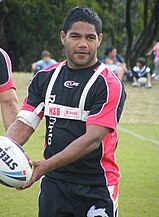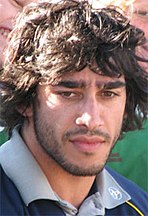|
Murri people
Murri is a demonym for Aboriginal Australians of modern-day Queensland and north-western New South Wales. For some people and organisations, the use of Indigenous language regional terms is an expression of pride in their heritage. The term includes many ethno-linguistic groups within the area, such as the Kamilaroi (Gamilaraay) and Yuggera (Jagera) peoples. Many Murri people play rugby league, and the annual Murri Rugby League Carnival is a big event in the sporting calendar. HistoryMany Murri were forcibly removed from their land, and placed on missions and Aboriginal reserves with other tribes with whom their relations may not have been friendly. From 1900 until 1972, a substantial number of Murri children became part of the Stolen Generations.[1] Along with all Australian Aboriginal people they were given suffrage in 1962 for federal elections, along with free access to Musgrave Park.[citation needed] The radio station Murri Country has been broadcast since 6 April 1993. It is operated by Brisbane Indigenous Media Association Ltd.[2] Ethno-linguistic groupsMany of the Murri peoples spoke languages of the Mari family, which was named after the Murri people, but ethnicity and language classifications do not correspond completely. Specific ethno-linguistic groups include:[citation needed]
Murri CourtsMurri Courts, a type of specialist community court for sentencing Aboriginal and Torres Strait Islander people in Queensland, were established in August 2002. After being closed down by the government in September 2012 as a cost-cutting exercise,[3] they were reopened in April 2016 under the Palaszczuk government.[4][5] SportSince 2011, the annual Murri Rugby League Carnival has been held with the support of the Arthur Beetson Foundation and the Deadly Choices organisation. Through the four-day Carnival, players are selected to represent the Queensland Murri Rugby League team to participate against touring teams in Australia or other countries. TerminologyFor some people and organisations, the use of indigenous language regional terms is an expression of pride in their heritage.[6] There are a number of other demonyms, or names from Australian Aboriginal languages commonly used to identify groups based on geography:
Notable Murri people
See also
NotesCitations
Sources
|
||||||||||||
Portal di Ensiklopedia Dunia










